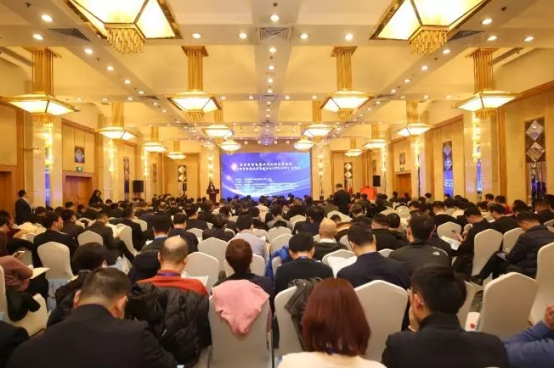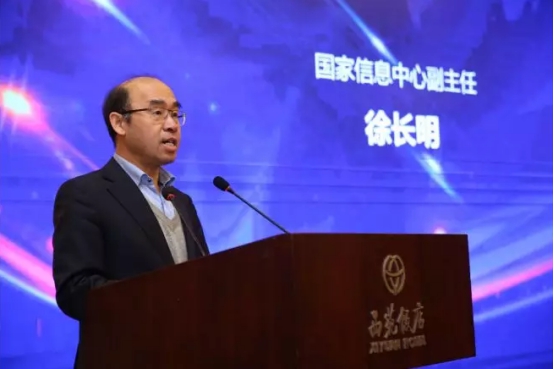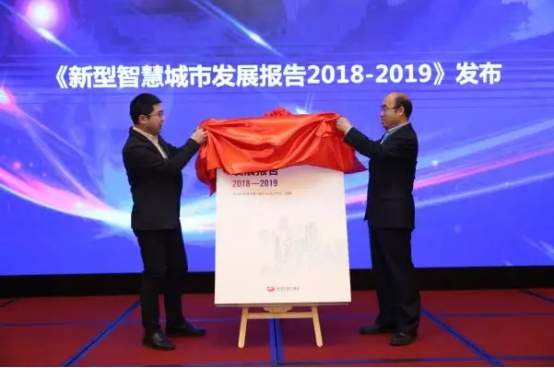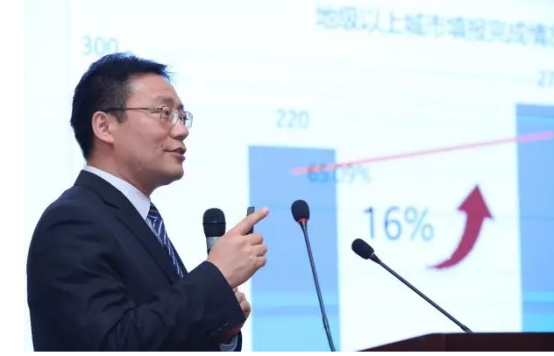
On January 14, 2020, guided by the Inter-Ministry Coordination Working Group for the Construction of New Smart Cities (hereinafter referred to as the "Inter-Ministry Coordination Working Group"), hosted by the Center) hosted by the State Information Center and the Secretariat of the Working Group Office (located in the SIC Smart City Development Research Center) , the National New Smart City Innovation Development Forum & the New Smart City Development Report 2018-2019 Launch Conference was successfully held in Beijing Xiyuan Hotel, and the “New Smart City Development Report 2018-2019” was officially released as well. The forum conducted a comprehensive review and systematic summary of the second national new smart city evaluation work completed in 2019. Participants conducted in-depth discussions on the new situation, new results, new ideas and new models of the construction and development of new smart cities across the country. Nearly 20 representatives of ministries and commissions from the member units of the National Development and Reform Commission, the Central Cyberspace Administration of China and the Inter-Ministry Coordination Working Group attended the meeting, while representatives from more than 20 provinces (regions, municipalities), more than 70 cities, ,more than 30 smart city enterprises, and representatives from scientific research institutes attended the meeting.

Xu Changming, Vice President of SIC, Che Haigang, Deputy Editor-in-chief of China Development Press and President of China Development Observation Journal, and Zhang Kailin, director of the Department of Innovation and High-tech Development of the National Development and Reform Commission attended the forum and delivered speeches. Shan Zhiguang, Director-General of the Information and Industrial Development Department & Director of the Smart City Development Research Center, and Secretary-General of the Secretariat of the Office of the Inter-Ministerial Coordination Working Group, gave a comprehensive introduction of the Report.

Vice President Xu Changming pointed out in his speech on behalf of the organizer that the construction of a new smart city is a major decision and deployment made by the Party Central Committee and the State Council based on urban development reality by actively adapting and leading the new normal and creating new momentum for economic development. In recent years, driven by the dual drive of policy dividends and technological innovation dividends, China's smart city construction is in full swing and vigorous development, and has increasingly become a model for implementing new development concepts. The 'New Smart City Development Report 2018-2019' released today records the status quo of China, Chinese stories, Chinese experience, and Chinese wisdom in the construction of new smart cities. It is hoped that it can provide reference and inspiration for the industry. SIC has undertaken a large number of smart city-related research and supportive services such as big data, digital economy, and strategic emerging industries. Therefore, it has formed a first-class team and research capabilities in smart city development policies, planning and design, research and consulting. A large number of development plannings, policy research, consultation and evaluation tasks have been completed with high quality. In the next step, we must promote the integration of blockchain underlying technology services with the construction of new smart cities, and promote the integration of e-government network construction and services with the construction of new smart cities and promote the combination of long-term development of construction and operation with the construction of new smart cities. It is necessary to promote the integration of network security guarantees with the construction of new smart cities, and strive to promote high-quality urban development. TSIC is willing to strengthen cooperation, deepen exchanges, and share wisdom with the vast number of local governments, industry enterprises, and scientific research institutions to help the healthy development of digital economy and smart society.

The "New Smart City Development Report 2018-2019" (hereinafter referred to as the "Development Report") compiled by the Inter-Ministry Coordination Working Group was officially released under the witness of representatives at the forum. The "Development Report" was compiled by the Secretariat of the Working Group Office under the joint guidance of the Office of the Inter-Ministry Coordination Working Group (located in the Innovation and High-Tech Development Department of NDRC) and the Information Development Bureau of the Central Cyberspace Affairs Office. , which is the only authoritative annual report at the national level in the field of new smart cities in China. It focuses on the second national evaluation of the construction of new smart cities, and systematically displays the evaluation process, self-evaluation data analysis results, and citizen evaluation analysis results. At the same time, it selects a batch of typical cases from more than 400 cases submitted by participating cities across the country. It has an important value for guiding local governments to pragmatically promote the construction of new smart cities and promote high-quality economic and social development. This annual report is published by China Development Press.

Shan Zhiguang introduced the background of the "Development Report", the optimization of the evaluation index system, the analysis of the evaluation results and the compilation process, while systematically summarized the characteristics, overall results and experience of the development of new smart cities across the country. He also introduced that this evaluation further highlighted the core concept of people-centered with the evaluation weight of citizens increased from 20% to 40%. The third-party citizen experience survey collected 1.07 million valid questionnaires involving 335 cities. The scope of evaluation is further expanded. A total of 275 prefecture-level and above cities across the country have completed the evaluation (an increase of 23.18% compared to 220 in 2017). At the same time, it has expanded to county-level with a total of 53 counties and county-level cities have completed the evaluation.
According to the results of city self-evaluation analysis, the progress of the construction of new smart cities nationwide is generally good. From the perspective of regional gap, the development level of the eastern region is leading across the country, and the level of the central region has increased substantially. The construction of smart cities is showing a trend of agglomeration. The construction of urban clusters in the Yangtze River Delta has achieved high results, and the effectiveness of urban construction within urban clusters is relatively balanced. A large number of cities in China have transitioned from the preparatory period for the construction of new smart cities to the initial and growth stages. The proportion of cities in the initial and growth stages has increased from 57.7% two years ago to 80%, while the proportion of cities in the preparatory period has dropped from 42.3% to 11.6%. Many cities have carried out a lot of work and achieved good results. The new smart city has entered a new stage of transition from overall planning to full implementation. The application of new technologies drives new development and new changes. The role of key elements of data has initially appeared. Multi-plan integration applications have gradually become popular, and services that benefit the people have changed from "available" to " easy to use".. Shan Zhiguang believes that smart cities are facing 12 transformation trends, including technological applications shifting from isolation to integration (more integrated), and system capabilities shifting from vertical to horizontal (more synergistic). The construction of a new type of smart city needs to continue toward these directions in the future.
In the keynote report of this forum, Ningbo Economic and Information Technology Bureau, Huawei, Yongtai county, China Mobile (Xiong’an) Industrial Research Institute, Inspur Group, Ant Financial Research Institute, Huzhou Administration,for Big Data Development, Hangzhou Shixia District and others have carried out in-depth discussions on the urban practice, solutions, technology and management model innovation of new smart city. Participants discussed issues, shared results and experiences, and finally reached consensus. It provides a useful reference for all departments and local cities to strengthen the construction of new smart cities.
